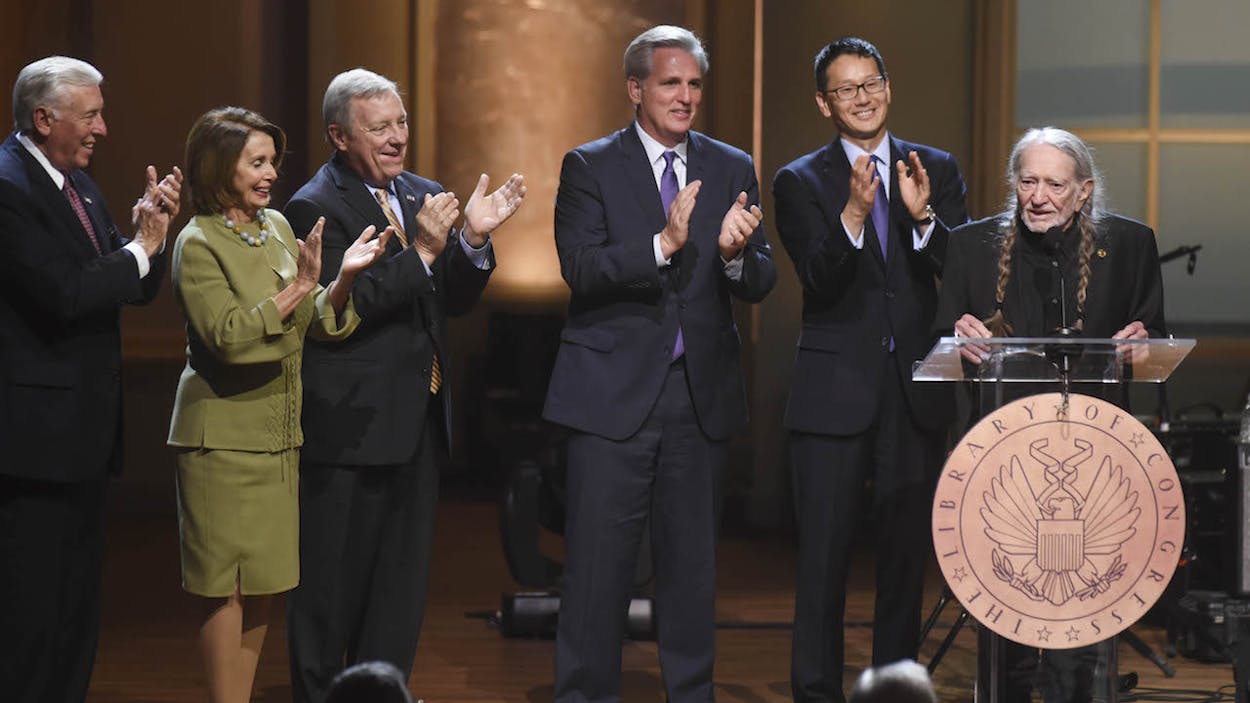To describe Willie Nelson as a national treasure is to undersell it. Our affinity for Willie here at Texas Monthly is rather well-documented, but we’re pleased to report that his greatness is official: As the winner of the Library Of Congress’ seventh Gershwin Prize for Popular Song, there’s a national seal of approval on the man’s career.
Willie was awarded the prize on Wednesday night at a concert in Washington, D.C. that featured performances by the man himself, along with Paul Simon (another recipient of the award), Neil Young (Willie’s Farm Aid bro) and Cyndi Lauper (sure, why not?).
The Gershwin Prize was created to honor a performer and songwriter whose work “reflects lifetime achievement in promoting song as a vehicle of musical expression and cultural understanding.” Willie certainly fits the bill as far as that goes, but what was so amazing about the previous prize recipients that took the Library of Congress so long to get to Willie?
The first Gershwin Prize recipient was Paul Simon in 2007. Simon makes sense—he’s had a decades-long career as both part of a duo and as a solo artist, he’s worked in multiple genres (including a truly spectacularly terrible Broadway musical), and nobody’s gonna argue with “Bridge Over Troubled Water.”
Similarly, the second recipient of the award, Stevie Wonder, has been making music magic since he was 11-years old. From Little Stevie Wonder to the man who gave us Songs In The Key Of Life and Innervisions, to a single that helped get Dr. Martin Luther King’s birthday honored as a national holiday to, okay, “I Just Called To Say I Love You,” it’s impossible for anyone with ears and a heart to say that Stevie Wonder doesn’t belong at the front of the line.
The third recipient, though, was Paul McCartney. No offense to Sir Paul, but he was kind of a curious choice, because: A) His solo output as a songwriter is not unimpressive, but it doesn’t exactly live up to the stuff that he shares a writing credit with John Lennon on; and B) It’s weird for the Library of Congress to bestow this award on somebody who isn’t American. (We’ll rescind this objection if the Queen of England grants knighthood to Willie Nelson.) Paul McCartney deserves most of the accolades he receives, to be certain, but we wouldn’t have bumped him to the top of the list ahead of Willie—or, say, Bob Dylan or Prince.
Following McCartney, Hal David and Burt Bacharach received the fourth Gershwin Prize. As lifetime achievement awards go, you could do worse than Bacharach and David—”Raindrops Keep Fallin’ On My Head,” “Do You Know The Way To San Jose,” and “I Say A Little Prayer” are all fairly perfect songs, and there’s a logic when it goes toward Hall of Fame-type awards that if you don’t honor people who haven’t been relevant in decades now, they’re never gonna get theirs. Bacharach and David’s oeuvre is relatively thin only when stacked against someone like Willie or Paul Simon, but it’s still kind of an iffy award.
The fifth Gershwin Prize recipient, though, was another front-of-the-line winner: Carole King is a no-brainer. “Will You Still Love Me Tomorrow,” being one of the best songs anybody ever wrote about anything, and like Willie Nelson, she was a prolific enough songwriter that it was probably the third timeless song she wrote that week (we’ll guess that the other two might have been “(You Make Me Feel Like) A Natural Woman” and “Some Kind Of Wonderful,” simply because that’s how deep her catalog is). Carole King is one of the most important songwriters in popular music, so A+ job, Library of Congress, good call.
Billy Joel followed Carole King to claim the sixth Gershwin Prize, which is on the iffy side again. The man hasn’t put out a record since 1993, and as a songwriter, he mostly wrote hits for himself and only himself (and, sure, countless people in karaoke bars around the world). Still, that may be regional bias at work—what Willie Nelson is to Texans, Billy Joel is to New Yorkers, so it’s possible that we just don’t get it.
Nonetheless, Willie Nelson taking the seventh prize does feel a little late. We couldn’t argue with Paul Simon, Stevie Wonder, or Carole King, but it’s also possible that when awarding the prize, they delayed Willie simply because he was so obvious. (Bob Dylan still hasn’t received one, and he probably casts a longer shadow than any songwriter in the history of popular music.) If every award is just crossing names off of a list that reads “Bob Dylan: ✓, Willie Nelson: ✓, Carole King: ✓, Stevie Wonder: ✓, Prince: ✓, Neil Diamond: ✓” it would probably make the first several years that the award existed pretty boring.
So we’re glad to know that Willie got the prize, even if it wouldn’t have been surprising to see the man who wrote—well, you don’t need us to run down the list for you—come in later than Bacharach, Billy Joel, and the guy who wrote “Simply Having A Wonderful Christmastime.” And the next time someone declares the man a national treasure, you can rest assured that it’s been vetted by the Library of Congress.








